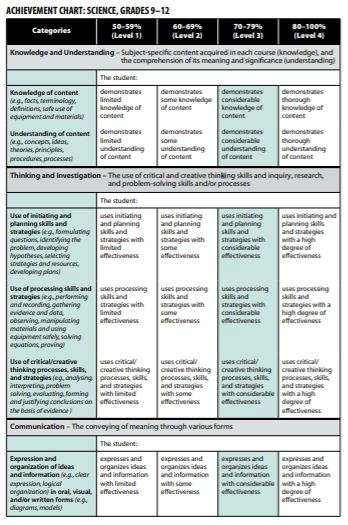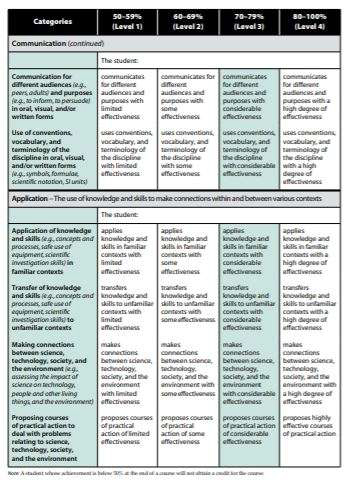Course Description
This course provides students with the opportunity for in-depth study of the concepts and processes that occur in biological systems. Students will study theory and conduct investigations in the areas of biochemistry, metabolic processes, molecular genetics, homeostasis, and population dynamics. Emphasis will be placed on the achievement of detailed knowledge and the refinement of skills needed for further study in various branches of the life sciences and related fields.
Course Code: SBI4U
Course Name: Biology Grade 12, University Preparation
Department: Science
Hours: 110
Credit Value: 1.0
Pre-requisites: Biology, Grade 11, University Preparation
Curriculum Policy Documents: The Ontario Curriculum, Science: Grades 11 and 12. 2007.
Growing Success: Assessment, Evaluation, and Reporting in Ontario School. 2010.
Development Date: August 2019
Developed By: Kelda Wells
Overall Curriculum Expectations
- A1. demonstrate scientific investigation skills (related to both inquiry and research) in the four areas of skills (initiating and planning, performing and recording, analysing and interpreting, and communicating).
- A2. identify and describe careers related to the fields of science under study, and describe contributions of scientists, including Canadians, to those fields.
- B1. Analyse technological applications of enzymes in some industrial processes, and evaluate technological advances in the field of cellular biology.
- B2. investigate the chemical structures, functions, and chemical properties of biological molecules involved in some common cellular processes and biochemical reactions.
- B3. demonstrate an understanding of the structures and functions of biological molecules, and the biochemical reactions required to maintain normal cellular function.
- C1. analyse the role of metabolic processes in the functioning of biotic and abiotic systems, and evaluate the importance of an understanding of these processes and related technologies to personal choices made in everyday life.
- C2. investigate the products of metabolic processes such as cellular respiration and photosynthesis.
- C3. demonstrate an understanding of the chemical changes and energy conversions that occur in metabolic processes.
- D1. analyse some of the social, ethical, and legal issues associated with genetic research and biotechnology.
- D2. investigate, through laboratory activities, the structures of cell components and their roles in processes that occur within the cell.
- D3. demonstrate an understanding of concepts related to molecular genetics, and how genetic modification is applied in industry and agriculture.
- E1. evaluate the impact on the human body of selected chemical substances and of environmental factors related to human activity.
- E2. investigate the feedback mechanisms that maintain homeostasis in living organisms.
- E3. demonstrate an understanding of the anatomy and physiology of human body systems, and explain the mechanisms that enable the body to maintain homeostasis.
Course Content
| Unit | Unit Title | Approx. Duration |
| Unit 1 | Biochemistry | 20 hours |
| Unit 2 | Metabolic Processes | 20 hours |
| Unit 3 | Molecular Genetics | 20 hours |
| Unit 4 | Homeostasis | 20 hours |
| Unit 5 | Population Dynamics | 20 hours |
| Laboratory Experiment | Formal Lab Report | 7 hours |
| Final Exam | 3 hours | |
| TOTAL | 110 hours | |
Evaluation Breakdown
| Evaluation Type | Percentage of Final Grade |
| Test 1 | 12% |
| Test 2 | 12% |
| Test 3 | 12% |
| Test 4 | 12% |
| Test 5 | 12% |
| Laboratory Investigation and Formal Lab Report | 10% |
| Final Exam | 30% |
| Total | 100% |
Achievement Chart
The following table provides a summary description of achievement in each percentage grade range and corresponding level of achievement:


Program Planning Considerations
- Modelling of expectations
- Reference to and use of online ESL and subject-specific and dictionaries
- Concrete examples and materials whenever possible
- Use of a variety of learning resources including visual material and cues, , graphic organizers and visual
- Materials that reflect cultural diversity
- Pre-writing strategies
- Previewing course readings / texts
- Community Connections
- Environmental Perspective
- Simulation
- Problem Solving
- Surveys
- Co-operative Learning
- Inquiry-based learning
- Cross-curricular connections
- think critically about themselves and others in the world around them in order to promote fairness, healthy relationships, and active responsible citizenship.
- work to high standards, as it affirms the worth of all students, and helps students strengthen their sense of identity and develop a positive self-image.
- value and show respect for diversity.
- Developing a learning environment where all students feel safe
- Promotion of diversity and inclusivity in the classroom
- Getting students involved within their school community
- Making community connections
- Peer tutoring
- Role playing
- Group discussion
- Case Study analysis
- Making community connections
- Peer tutoring
- Role playing
- Group discussions
- Case study analysis
- Simulation
- Problem solving
- Cross-curricular connections
- Media connections
- Surveys and interviews
- Model ethical behavior
- Explore ethical standards
- Explore ethical concerns
- Inclusive practices
- Foster positive relationships with others
- Assist students in developing an understanding of ethical judgments
- Assist students in understanding confidentiality standards
- Community connections
- Simulation
- Problem Solving
- Inquiry-based learning
- Cross-curricular connections
- Issue-based analysis
- Critical literacy skills
- Setting financial goals
- Developing intra-personal skills
- Reading, interpreting, and analysing various texts, including diaries, letters, government legislation and policy documents, interviews, speeches, information from non-governmental organizations, news stories, and fiction and non-fiction books
- Extracting information
- Analysing various types of maps and digital representations, including charts, diagrams, pictures, etc.
- Using appropriate and correct terminology, including that related to the concepts of disciplinary thinking
- Making community connections
- Peer tutoring
- Role playing
- Group discussions
- Case study analysis
- Simulation
- Problem solving
- Cross-curricular connections
- Media connections
- Kinesthetic opportunities
- Foster use of proper terminology
- Inquiry and research skills
- Help students to develop a language for literacy, inquiry and numeracy skills
- Assist students with developing communication skills in areas of literacy, inquiry and numeracy
- Experiential Learning: Library visits, Guest Speaker, Role Playing, mock trials, writing anthology, author visits, writers reading, theatre workshops
